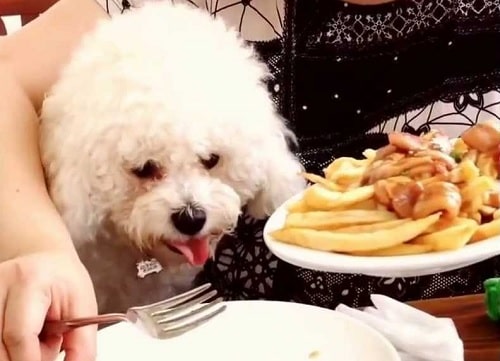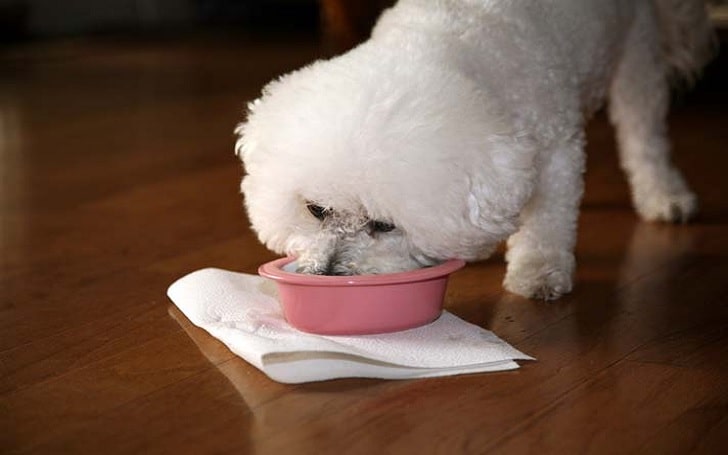Bichon Frise Diets
Bichon Frise is a small-sized, white dog breed that was bred for the purpose of companion or toy dog. Its friendly, lively, and affectionate temperament makes it an excellent companion dog for a loving family.
Here is the article about the diets and supplements for your Bichon Frise as well as feeding and human food for them.
Diets
A complete nutritional diet is very necessary for a healthy and happy living of your dog. Whether you feed your Bichon Frise a commercially manufactured dog food or homemade food, make sure to calculate the nutritional contained in it for a complete balanced diet.
Protein: It is a very important nutrient for any dog as protein contains amino acids which are the building block of the cell. It helps to build muscles, tissues, skins, hair, and blood. They get protein from meat, fish, salmon, etc which should be 18% on their regular diet.
Fat: The main source of energy for your dog is fat which should be 8% on their diet. This nutrient helps your dog to maintain a healthy coat, skin, immune system and development of the strong bones.
Vitamins: Vitamin is a basic necessity of your dog which is responsible for many functioning of the body. There should be at least 1%-2% of the protein in your dog’s diet.

Image Source: YouTube-@ kristen medina
How Much to Feed Bichon Frise?
The feeding amount of the Bichon Frise depends upon its age and activity level. When the Bichon Frise puppies are very young, they need to be fed 4 meals a day. Since they are in the age of developing, they need a good amount of dog food for proper physical growth.
When the puppies grow and reach the adolescent age, their meal should be reduced to 3 and then 2 meals a day. As the Bichon Frise reaches adulthood, their activities increases and while training, there are lots of treats included. So, 2 meals a day will be enough for your dog otherwise, it will face the problem of obesity.
If your dog is involved in vigorous physical activities, increase the amount of food accordingly. and vice versa.
Best Dog Food For Bichon Frise

Image Source: Getty Images
While buying dog food for your Bichon Frise, make sure to look at the ingredients and nutrients contained in it. Good quality of dog food determines its long and happy life. So, always go for high-quality dog food with the right nutrients inside the package.
- Nature’s Variety Instinct Raw Boost Small-Breed Duck Recipe
- NomNomNow Fresh Dog Food Delivery
- American Journey Salmon
Best Supplements for Bichon Frise
If your Bichon Frise is getting a complete nutritional diet, there is no need to provide them with extra supplements. Only provide them with supplements if there is some nutrient lacking in their diet.
- Probiotics
- Antioxidants
- Glucosamine
- Multivitamins
- Omega-3 and 6 Fatty Acids
Human Food That the Bichon Frise Can and Cannot Eat
Not all human food is bad and not all are good for your dog. Sometimes you can feed your dog a small portion of food from your plate which does no harm to them unless fed in a heavy amount. And there is some human food, that can be serious for your dog’s health which should be avoided completely.
Here is the list of some of the food for the human that your Bichon Frise can eat in a small amount and should avoid completely.
Can Eat
Cannot Eat
- Too much salt
- Garlic
- Chocolates
- Lime
- Avocado
Why is Your Bichon Frise Not Eating?
- Your Bichon Frise might be having some dental problems which are causing it not to eat due to pain. Therefore, check their teeth to see swollen or bleeding gum. Take it to a vet if there is any sign of a dental problem.
- Your dog might have eaten something due to which it is facing an upset stomach. It might be due to something they have eaten which can be a temporary problem. However, if they do not eat for a long time, take your dog to a vet.
Visit Doglime for more dog breeds information and their diets.
Tags










